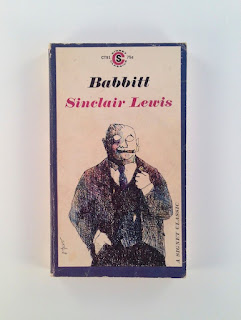Of my many quirks and idiosyncrasies, I like to read books that coincide with anniversaries. I read Willa Cather’s My Antonia and Karel Capek’s R.U.R. (Rossum’s Universal Robots) on the 100th anniversary of their publication and Laura Dassa Walls’s biography of Thoreau on the 200th anniversary of his birth. 2022 is the 100th anniversary of the publication of Sinclair Lewis’s Babbitt, the satirical novel of middle class life in America. While 2022 is also the 100th anniversary of James Joyce’s Ulysses, I thought Babbitt might be more digestible.
A 100th or 200th year
span is enough to give you a broad, sweeping perspective on things. I am fascinated to see what things have
changed and what things have not and what challenges and issues the characters
wrestle with.
Babbitt centers on the life of a
middle aged real estate broker, George Babbitt, an average guy trying to carve
out a reasonably successful life in the fictional growing Midwestern city of
Zenith. He has a dull marriage to a nondescript woman, Zilla. Babbitt is torn between becoming a pillar of
the community and accepted and welcomed into the upper echelons of the town,
and becoming somewhat of a rebel, an outsider, a rulebreaker.
Struggling to find meaning in his
desultory life, George Babbitt eventually breaks down and has what has come to
be known as a mid-life crisis, has an affair, starts hanging out with a racier
crowd and rejects the more staid, conforming upstanding society. He eventually returns to his wife, and, after
initially rejecting membership to the country club, back to the community after
veering off course.
Like Capek’s R.U.R. (presciently
dealing with artificial intelligence and robots), I find Babbitt’s continued
relevance most interesting. Today, there
are millions of Babbitts earning a living in transactional businesses in a
modern, interlinked economy in sales, law and a myriad of professions, whose
existence is merely to facilitate transactions and these people try to find
some meaning in their work. The velocity
and technology may have changed but the emptiness and the need to fill that
emptiness has not.
The wariness of “the other” is
still with us and has not changed much over the past century. Mores have changed. Sinclair Lewis’s use of the “n” word and his
disparagement of Jews (he uses the word “Jew” as a verb in dialogue) jolt the
modern day reader, but many themes remain the same. Babbitt says this about blacks:
“I don’t know what’s come over
these n****s, nowadays. They never give
you a civil answer.”
“That’s a fact. They’re getting so they don’t have a of
respect for you. The old-fashioned coon
was a fine old cuss—he knew his place—but these young dinges don’t want to be
porters or cotton-pickers.”
These quotes might be shocking to
modern sensibilities, but the underlying tensions are still with us, especially
as we wrestle with critical race theory in schools and in large corporations.
Babbitt also contains dialogue
dealing with the right level of immigration, and how to assimilate those
immigrants.
Similarly, in the post-WWII
period, we took for granted that the path to middle class or upper middle class
life necessarily went through college.
As we see the degradation of standards and degrees in universities, and
the recognition that truck drivers and skilled electricians may have a bigger
role to play in our day to day lives than middle managers in banks, and the out
of control costs of college, conventional wisdom is being questioned once
again. As Babbitt observed a century
ago:
I’m a college man—I know! There is one objection you might make
though. I certainly do protest against
any effort to get a lot of fellows out of barber shops and factories into the
professions. They’re too crowded already, and what’ll we do for workmen if all
those fellows go and get educated?”
Reading these century old works
is a real treat. Certainly, much has
changed. But in many ways, many of the
issues are still here in American life.
Babbitt is an interesting lens through which to view America in 2022.

No comments:
Post a Comment